The trauma surgeons battling to save young victims of knife crime
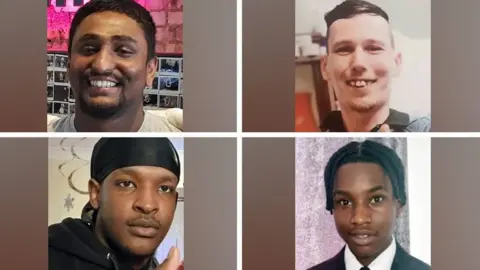 Bedfordshire Police
Bedfordshire PoliceThe trauma team at the Luton and Dunstable Hospital says it treats more victims of violence than any other in the East of England. The main concern is the ever-present scourge of knife crime. In September, five people were stabbed in Luton in one day. Among them, a 16-year-old who died.
As police in Bedfordshire launch a week of action on knife crime, hospital surgeons Mr David Kirby and Dr Amir Reyahi describe first hand the battle to save young lives inside - and outside - the emergency ward.
- Warning: This story contains some graphic medical detail

'I held his heart in my hands'
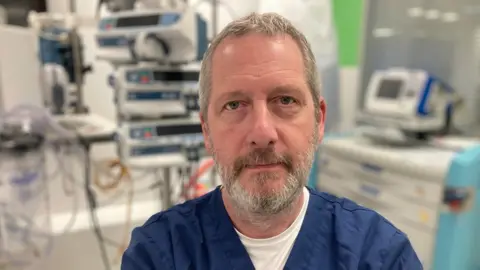 DJ McLaren/BBC
DJ McLaren/BBCMr David Kirby, consultant in emergency medicine, says: "When I went into emergency medicine, I wasn't naïve to the fact that a lot of our work is from violent assault, but I never thought I'd see so many young people stabbing each other so indiscriminately.
It's devastating on the staff.
Some have needed counselling because of the cases they've seen over the past few months. When you're talking about hardened staff like us, that's saying something.
The patients are almost inevitably young people and you look at them and think - that could be my own child.
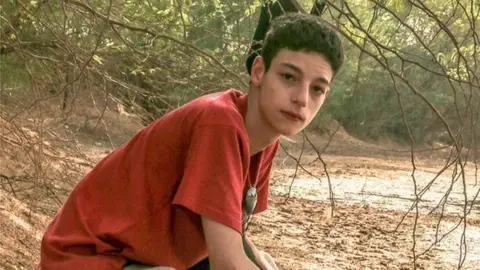 Roseann Taylor
Roseann TaylorAzaan Kaleem, known as AJ, was the one who made me want to work in violence reduction, to see if we could stop these kids from coming to us in the first place.
AJ came in on a Thursday in March 2018. He'd been stabbed just for looking at someone the wrong way.
We opened up his chest and I held his heart in my hands. At one point I had my finger in the hole in his heart because it was beating but we needed to stop the blood coming out.
He survived for two days but his brain had died, and so his life support was turned off.
That particularly affected me. I went home that night and I didn't sleep at all.
When you see someone die, despite all your best efforts, it's really difficult to take. You start to doubt your own abilities.
Then you have to tell the family that their loved one isn't coming home and on top of that there'll be a post-mortem, an inquest, and probably a court case.
You just know that their world has completely turned upside down and will never be the same again.
I got to know his mum, Roseann, quite well. We went to parliament and spoke to MPs about knife crime.
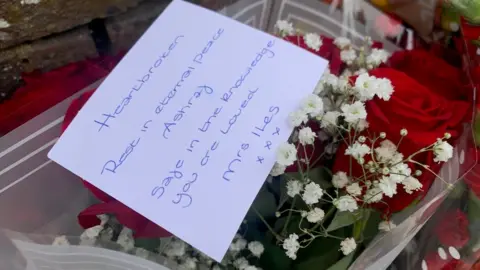 Janine Machin BBC
Janine Machin BBCWhen stabbings appear in clusters, that's really un-nerving. We're all thinking 'well we've had several today, will there be several in retribution tomorrow?' It does set you on edge.
We worry for our own safety too.
We know you're more likely to be stabbed with your own knife so it's not unreasonable to think that the person in front of us may have a weapon. Unless they're unconscious and can't hurt us, we will not start to treat them until we know they're not armed.
Sometimes people who are injured are just carried in off the street. The police don't know about these cases and because of confidentiality issues, we can't always report it.
It's hard, but people need to know they can come to us in confidence if they're hurt, otherwise what happens to them?
There's always been a discrepancy between the amount of violent crime and what's reported.
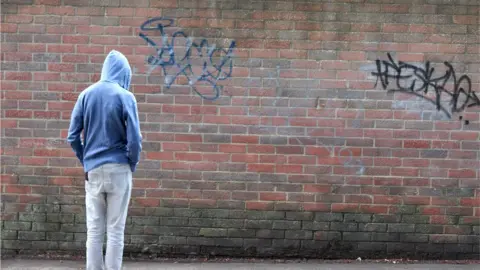 Getty Images
Getty Images'Screaming for morphine'
These young people tell you they carry knives for a particular reason, but I can't get my head around that. The level of violence is just so disproportionate to the reasons for it.
If someone gets stabbed, one person ends up here or in a body bag, the other ends up in a prison cell. Two lives are ruined.
You hear young people say getting stabbed doesn't hurt. It does. That's why they come in here screaming for morphine. And then what we have to do to stop them from dying certainly hurts. It's not a badge of honour. It's a life of pain.
We may think the answer is going into schools and sharing our experience, but listen to the kids. What do they think?
For years we've talked about having crisis workers embedded in the hospital to help these injured young people find a different path in life. Well, that's about to happen now.
We'll do anything."

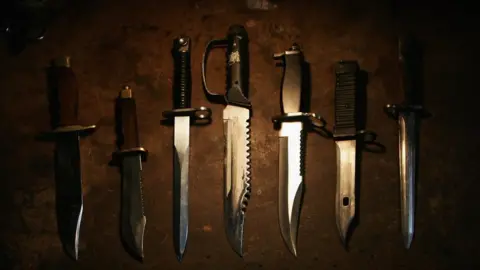 Getty Images
Getty ImagesOperation Sceptre: A week of action on knife crime in Bedfordshire
- Bedfordshire Police have recorded an average of 18.5 people under the age of 25 involved in knife crimes every month in 2023.
- "Knife crime" includes, possessing a bladed weapon and using a bladed weapon to threaten or injure.
- In September, the number of Serious Youth Violence crimes (serious assault, knife and gun crime involving under 25s) in the county reached its highest level this year at 189.

'The consequences are life-altering'
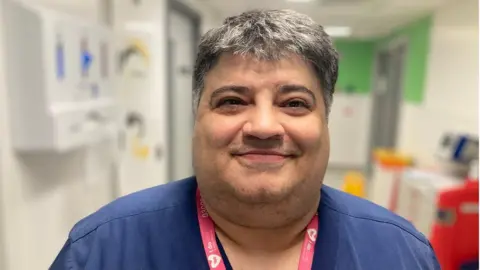 DJ MCLAREN BBC
DJ MCLAREN BBCDr Amir Reyahi, emergency medicine specialist, says: "This is personal for me. I'm from Luton. I went to school here. This is my local hospital and my community.
From talking to other heads of trauma in the region I'd say our hospital treats more victims of violence than any other in the East.
If there's anything I can do to stop even one child from being involved in knife crime, I see that as a positive.
I work with Luton's youth offending service, local councillors and schools. I speak to children from the age of 11 to 16. Some have already committed some kind of violent crime.
It's about making them understand what happens when they go out with weapons.
You have to keep drilling it in. It's difficult.
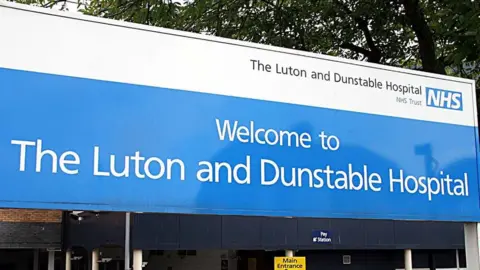 South Beds News Agency
South Beds News AgencyThey have lots of misconceptions. They think that if they're not carrying the knife themselves, they're ok. But if they're part of a group which is armed they can be prosecuted just the same.
They think there are safe areas on the body to stab people like the shoulder or the leg, but there are major blood vessels there and the consequences are life-altering.
It's not just about life it's also about limb.
We've seen 15- or 16-year-olds lose an arm or a leg from stabbings. They're disabled from that moment on.
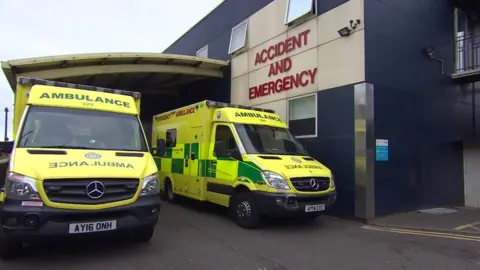
I try to open their eyes to the parts they don't see.
If we don't know who the perpetrator is, we have to lock down the A&E department.
We've had times when an offender has tried to pretend to be a victim's relative, so nobody's allowed in or out and that affects all the patients.
Young offenders have a different understanding to general school students, but there's a recurring theme.
They say they carry weapons for protection. I ask 'protection from what?'
Sometimes they've been excluded from school - that's an absolute trigger for it. Some are from deprived areas or involved in gangs and county lines. There are so many things they can get involved in and sometimes they don't even know they are.
When you make them understand, they do see it with different eyes, but I'm frustrated that I can't get through to enough of them."
- If you have experienced child bereavement or been a victim of violent crime, help and support is available via BBC Action Line.

Follow East of England news on Facebook, Instagram and X. Got a story? Email [email protected] or WhatsApp 0800 169 1830
